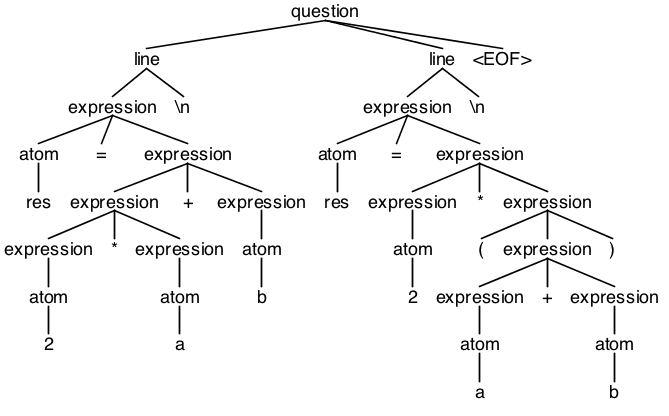From The Definitive ANTLR 4 Reference, 5.4 Dealing with Precedence, Left Recursion, and Associativity :
expr : expr '*' expr // match subexpressions joined with '*' operator
| expr '+' expr // match subexpressions joined with '+' operator
| INT // matches simple integer atom
;
The problem is that this rule is ambiguous for some input phrases. ...
This is a question of operator precedence, and conventional grammars
simply have no way to specify precedence. Most grammar tools, such as
Bison, use extra notation to specify the operator precedence.
Instead, ANTLR resolves ambiguities in favor of the alternative given
first, implicitly allowing us to specify operator precedence.
So simply put multiplication before addition.
File Question.g4 :
grammar Question;
question
@init {System.out.println("Question last update 1213");}
: line+ EOF
;
line
: expression NL
{System.out.println("Expression found : " + $expression.text); }
;
expression
: expression mult='*' expression # expressionMultExpression
| expression add=( '+' | '-' ) expression # expressionAddExpression
| VARIABLE '=' expression # expressionAssign
| '(' expression ')' # parenthesisedExpression
| atom # atomExpression
;
atom
: INT #int
| VARIABLE #var
;
VARIABLE : LETTER ( LETTER | DIGIT )*;
INT : DIGIT+;
NL : [\r\n] ;
WS : [ \t] -> channel(HIDDEN) ; // -> skip ;
fragment LETTER : [a-zA-Z] ;
fragment DIGIT : [0-9] ;
File input.txt :
res = 2 * a + b
res = 2 * ( a + b )
Execution :
$ grun Question question -tokens -diagnostics input.txt
[@0,0:2='res',<VARIABLE>,1:0]
[@1,3:3=' ',<WS>,channel=1,1:3]
[@2,4:4='=',<'='>,1:4]
[@3,5:5=' ',<WS>,channel=1,1:5]
[@4,6:6='2',<INT>,1:6]
[@5,7:7=' ',<WS>,channel=1,1:7]
[@6,8:8='*',<'*'>,1:8]
[@7,9:9=' ',<WS>,channel=1,1:9]
[@8,10:10='a',<VARIABLE>,1:10]
...
[@32,36:35='<EOF>',<EOF>,3:0]
Question last update 1213
Expression found : res = 2 * a + b
Expression found : res = 2 * ( a + b )
and
$ grun Question question -gui input.txt
![enter image description here]()

